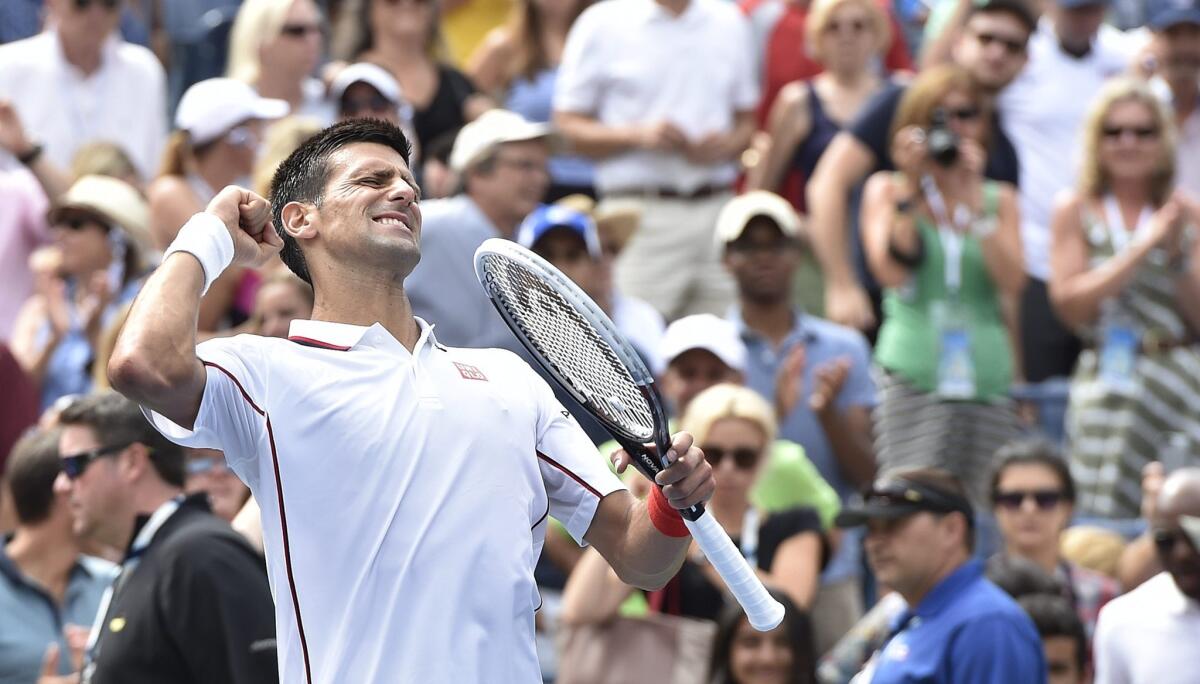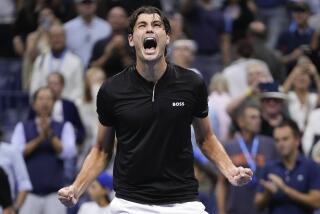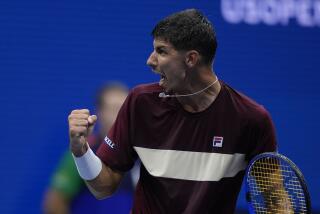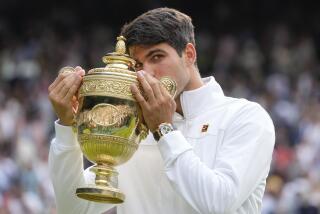After all these years, Novak Djokovic is still refreshing

— Like a great novel, or a perfectly cooked filet mignon, Novak Djokovic is fast becoming one of the joys of my life.
He came on the tennis scene about a decade ago as yet another Eastern European player whose name was impossible to spell. I could handle Novak. But who starts their surname with the letters D and J? Can’t at least some of these players change their name to Smith?
We had to learn. He gave tennis typists no choice. He just kept winning, playing at the highest level, always trying his best, fighting for every point on the court and smiling a lot off it.
Who can ever forget his late-night introduction to the U.S. Open? The TV interviewer had heard he did impressions of other players. He asked Djokovic if he’d do some.
What a spot. He was from Serbia, barely 20 years old. His first language — and maybe his second and third — wasn’t English.
Djokovic barely blinked. His instincts for fun are like his instincts for a cross-court passing shot.
Soon, millions were being treated to a perfect John McEnroe, contorting into his robotic service motion. And Maria Sharapova, tiptoeing away from the baseline to have one of her little talks with herself, then brushing away a strain of hair.
A star was born that night. The tennis skills had already been established. But a personality? Who knew?
Now, it is the U.S. Open, 2014. Djokovic is 27 years old, recently married and with a child on the way. He has won seven Grand Slam titles and has had a year that included a dramatic final loss at the French Open to the Czar of Clay, Rafael Nadal, and a dramatic final victory at Wimbledon over the Guru of Grass, Roger Federer.
Saturday, he wasn’t even on the radar as a column topic, other than to provide a frame of reference for U.S. men’s tennis in a match against a top American player, Sam Querrey.
They played an early afternoon match in Arthur Ashe Stadium, and the faithful, once again, almost filled the gigantic place. It would be nice to think most were there to see the magical tennis of Djokovic. But many came as part of a hope-springs-eternal gathering of backers for Querrey, who has a big serve, a big forehand and a pilot light burning in his belly.
The match was more one-sided than expected. A 6-3, 6-2, 6-2 drubbing is not Querrey’s best effort. He himself called it “a beatdown.”
From the standpoint of U.S. tennis, it was depressing to watch. John Isner lost later, meaning no American men made it past the third round in their own Grand Slam tournament.
Worse, Djokovic didn’t just beat Querrey, he toyed with him. He hid it well enough so it wouldn’t be easily apparent to fans, but he actually worked on things like drop shots and chipping-and-charging. For him, this was more a practice session than a Grand Slam third-rounder.
Querrey responded with nothing. And later, when he met the media, he said his performance this year in the Grand Slams “wasn’t bad,” adding, “Australian Open third round, here third round; Wimbledon, lost a tough one to [Jo-Wilfried] Tsonga in the second round; French Open lost in the second round…”
Somewhere, Jimmy Connors is throwing a vase against the wall.
Still, Querrey’s indifference is easy to understand. His career prize money to date is $5,572,654. That’s before he collects his $60,000 for getting through the second round here. He is currently ranked No. 57.
So, the day had presented no surprises, just more depressing underachievement by our homegrowns. Nice that we can put on such a great event to showcase all the star tennis players from foreign lands. Is this a great country or what?
Quickly, Djokovic changed the mood.
In his news conference, without much prodding, he talked refreshingly about human stuff, about marriage and upcoming fatherhood, about reading poetry and listening to music, about how his parents guided him and taught him perspective, and about how tough it was to be in Serbia in the 1990s with two wars going on and often not enough money to even travel to junior tournaments.
“I’m so happy and grateful for the life I have had,” he said.
Then came another Djokovic moment.
The tour official ended the interview and Djokovic stopped him, asked for his indulgence, and invited a young girl to join him on the interview dais. She was 9, her name was Zia Uehling and she had been sitting on her father’s lap in the front row. Djokovic said she was a prodigy. Not in tennis. In music.
“This is a very valuable experience for her,” Djokovic said, “so please ask her a question.”
Somebody did and soon she was singing one of the five songs she has written, apologizing that she didn’t have her guitar with her. It was called “African Sun,” she sang every verse, standing next to Djokovic as he beamed a smile at her, and it was delightful enough to bring tears to your eyes.
It turns out that Djokovic stays at the Uehling home in nearby Alpine, N.J., when he plays the U.S. Open. Zia’s father, Gordon, is a former tour player and longtime friend. Djokovic invited Gordon to the news conference and asked him to bring Zia along. Gordon had no idea what was going to happen.
As Djokovic was leaving, reporters gathered around Zia and her dad. The No. 1 tennis player in the world surveyed the scene with a big smile and said, “Keep talking to her. I’ll get out of the way.”
More to Read
Go beyond the scoreboard
Get the latest on L.A.'s teams in the daily Sports Report newsletter.
You may occasionally receive promotional content from the Los Angeles Times.











